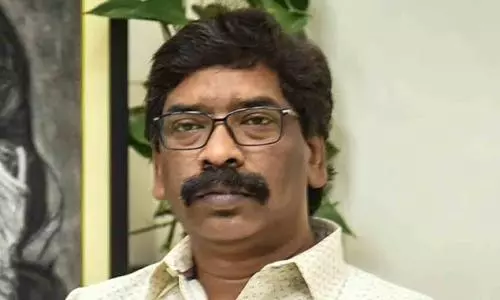
India votes against United Nations draft resolutions on NPT
text_fieldsUnited Nations: India has voted against the provisions of draft resolutions that would have required it to accede to the Nuclear Non-Proliferation Treaty (NPT), saying there is "no question" of it joining the treaty as a non-nuclear weapon state.
Deeply concerned about the growing dangers of nuclear and other mass destruction weapons caused by proliferation networks, the First Committee of the 193-member UN General Assembly that deals with disarmament and international security issues approved a draft resolution Thursday urging all member states that had not yet done so to sign and ratify the Comprehensive Nuclear-Test-Ban Treaty.
Prior to approval of that draft as a whole, votes were polled on provisions, including on operative paragraph, by which the Assembly would call on all those countries that have not joined the Nuclear Non-Proliferation Treaty (NPT) to accede to it as non-nuclear weapon states.
The provision was retained by a recorded vote of 164 in favour, with Democratic People's Republic of Korea, India and Israel voting against it.
In its explanation of vote, India said it cannot accept the call to accede to NPT as a non-nuclear-weapon state.
"India's position on the NPT is well-known. There is no question of India joining the NPT as a non-nuclear weapon state. Nuclear weapons are an integral part of India's national security and will remain so, pending non-discriminatory and global nuclear disarmament," it said.
The Committee then took four recorded votes on a resolution 'Towards a nuclear weapon-free world: accelerating the implementation of nuclear disarmament commitments'.
The text was approved as a whole by a vote of 166 in favour to seven against, with Korea, France, India, Israel, Russian Federation, the UK and the US opposing it.
By another provision in the resolution, the Assembly would stress the fundamental role of NPT in achieving nuclear disarmament and non-proliferation and urge India, Israel and Pakistan to promptly accede to the Treaty as non-nuclear-weapon states and place all their nuclear facilities under IAEA safeguards.
The provision was retained by a recorded vote of 163 in favour with India, Israel, the US and Pakistan voting against.
In its explanation of vote, India said it remains committed to the goal of complete elimination of nuclear arms.
"We are concerned about the threat to humanity posed by the continued existence of nuclear weapons and their possible use or threat of use. India also shares the view that nuclear disarmament and nuclear non-proliferation are mutually reinforcing. We continue to support a time-bound programme for global, verifiable and non-discriminatory nuclear disarmament," it said.
India said in urging it to accede to NPT "promptly and without conditions," the draft resolution negates the rules of customary international law, as enshrined in the Vienna Law of Treaties, which provides that a state's acceptance, ratification or accession to a treaty is based on the principle of free consent.
India said it has noted that this year the resolution makes several references to the humanitarian impact of nuclear weapons and urges its consideration in the NPT framework, a treaty that focuses exclusively on restraints on possession of nuclear weapons and is completely silent on restraints on use of nuclear weapons.
India pointed out that it participated in the Oslo and Nayarit meetings on the humanitarian impact of nuclear weapons in the hope that renewed attention on the most serious threat to the survival of mankind posed by the use of nuclear weapons would help generate momentum for increased restraints on use of such weapons.
This would help correct an imbalance in the international legal discourse that has focussed almost exclusively on restraints on possession.
"For these discussions to be meaningful, it is important that they be inclusive with the participation of all states including the nuclear powers. In terms of substance, they should do no harm to the non-proliferation regime or impede genuine progress towards the goal of nuclear disarmament. In terms of process, they should do no harm to the established disarmament machinery," India said.
Another provision in the draft resolution would have the Assembly reiterate its call for the immediate start of negotiations in the Conference on Disarmament on a treaty banning the production of fissile material for nuclear weapons.
It was retained by a recorded vote of 166 in favour to two against while India, Iran, Israel, Democratic People's Republic of Korea abstained.
India said as it supports the commencement of negotiations on an Fissile Material Cut-off Treaty in the Conference on Disarmament, the question of a moratorium on the production of fissile material for nuclear weapons does not arise.
India abstained from voting on an operative paragraph of the resolution by which the Assembly would stress the importance of the universalisation of the International Atomic Energy Agency (IAEA) safeguard agreements.
Another provision, the preambular paragraph was retained by a recorded vote of 167 in favour with India and Israel voting against.
It would have the Assembly call upon states that had not done so to accede to the NPT and accept IAEA safeguards.
India abstained from voting on a provision that would have the Assembly stress the importance of the universalisation of the IAEA safeguard agreements to include states which had not yet adopted and implemented such an agreement.























